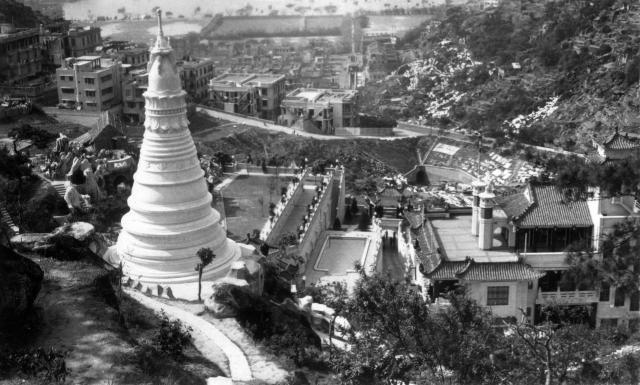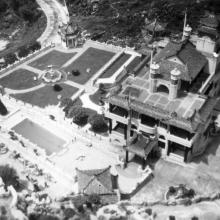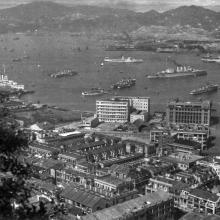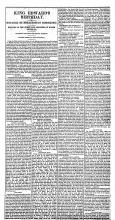I don't recall seeing a stoopa at the garden in 1958. Had it been demolished by then? The hillside on the right was still in 1946 bare of all the squatters' huts that we saw in 1958. It looks as though the terraces were still being cultivated but, even on my higher resolution copy, I cannot make out what all the white items littering the slope were. In 1946 they cannot have been plastic! Any suggestions? The blocks of flats on Wang Fung Terrace are in the top left corner.
Tiger Balm Gardens 1946.
Primary tabs

Submitted by Andrew Suddaby
Date picture taken (may be approximate):
Tuesday, January 1, 1946
Gallery:
Connections:
- Tiger Balm Gardens 1946. shows Place Tiger Balm Gardens, or what's left of it. [1935-2002]




Comments
You can still find a stupa in
You can still find a stupa in later photos (https://gwulo.com/node/2421/photos), though I note it changes colour several times!
I think I've seen photos of a laundry on the hillside in the distance, so those white patches would be washing laid out to dry.
Thank for the information on
Thank for the information on the stupa, David. Does anyone know when the pagoda was demolished - and why? Andrew
Unfortunate Demise
Sold for redevelopment in 1998. Some information here
Thanks Moddsey,
Thanks Moddsey,
It's a shame that commercial interests caused the demolition of what must have been the only 'full size' pagoda in Hong Kong. While modern, it still added a touch of glamour to a city that has become just another high rise metropolis. Andrew
1946 was before the Communists overran China
So there was no influx of refugees from China and no squatters at Tai Hang Hillside until after 1949 when CCP set up the People's Republic of China.
Tai Hang means "Big Nullah" in Chinese and there was a big nullah of fresh stream water running down to Tai Hang and discharge into the harbour where people did their washing including commercial laundry of bedsheets and banquet table cloths of the Chinese restaurants. They just hanged them to the hillside to dry, hence I guess those little white dots of liens.